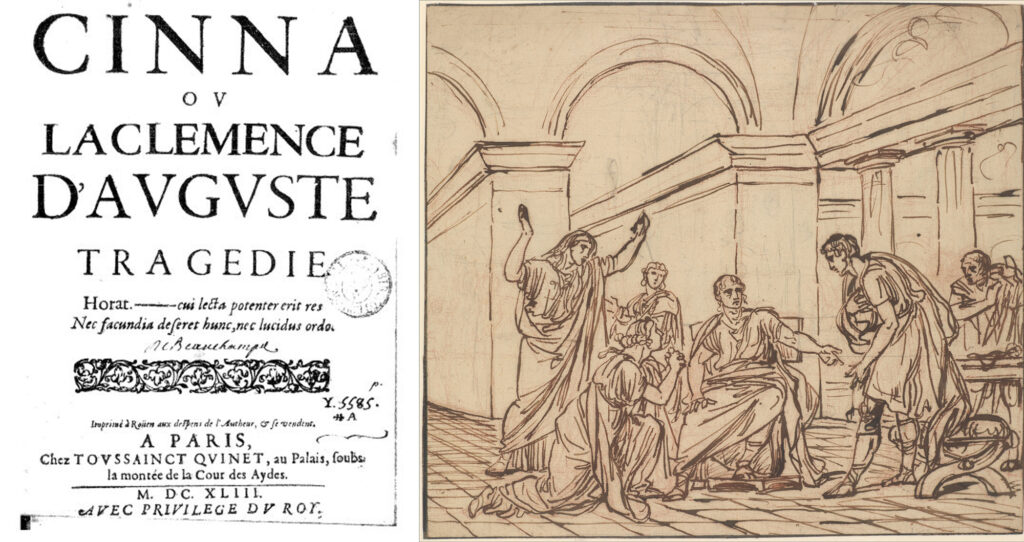In 2023, I emailed 215 art-related items to supporters of my Sunday Recommendations list. This week: my favorites in literature, with novels, dramas, short stories, and poetry. This post is available as a video at https://youtu.be/lwqIXqmr6YQ .
Novels
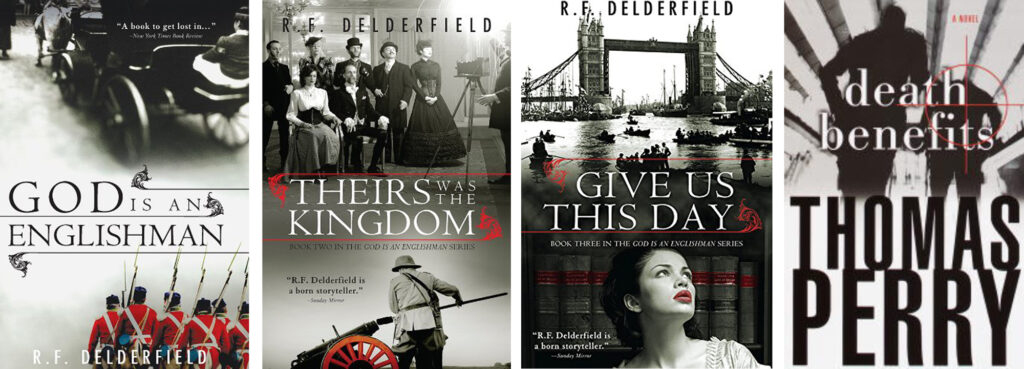
- Winner: Delderfield, R.F. Swann trilogy (1970-1973). God Is an Englishman, 1970; Theirs Was the Kingdom, 1972; Give Us This Day, 1973. Unlike many of his compatriots, Adam Swann, a British officer, recognizes the sweeping and permanent changes the Industrial Revolution is bringing. He returns home from a tour in India determined to open a business, although he has little but intelligence, determination, and a piece of looted jewelry. Although this is a multi-generational saga, the focus is always on Swann and his business rather than his family – although his family members are often directly involved in the business.
- Runner-up: Perry, Thomas. Death Benefits (2001). Thomas Perry has been writing thrillers and murder mysteries since 1983. I enjoyed Death Benefits even more the second time. Stillman, one of the main characters, says, “Never judge people by what they have. That’s mostly luck. Judge them by what they want. Do they want to mind their own business and be somebody decent, or do they never quite feel right unless they take what they get from somebody else and leave them bleeding so they can savor the contrast?” My favorite among his books is still Island, which I recommended in a blog post back in 2016.
Drama
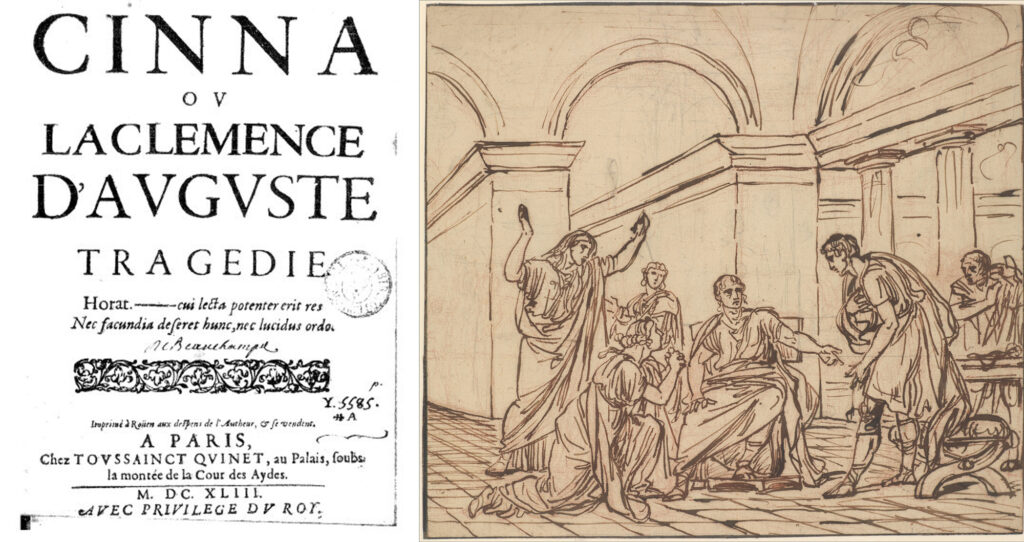
- Winner: Corneille, Pierre. Cinna (1641). Remember when I said several weeks ago that Menander wrote plays about young lovers, grumpy fathers, devious slaves? This is not that kind of play. Written in the 1640s and set in the early years of the Roman Empire, it centers on a woman who demands that Cinna (her beloved) kill Emperor Augustus, who ordered her father to be executed. But Cinna believes that it’s better for Rome to be ruled by Augustus than to suffer through yet more civil wars. Corneille is a master at dramatizing controversial moral and political points. In the passage below, Cinna speaks to Augustus about the Roman Republic. The situation was very relevant to Corneille’s time, when Louis XIII of France faced a series of religious and political uprisings. (This is my translation; in French, the section begins “Mais quand le peuple est maître.”)
But when the people rule, only tumult happens.
The voice of reason is never consulted.
Honors are sold to the most ambitious;
authority is handed over to the most seditious.
These petty rulers that last only a year,
seeing their control cut off after so short a time,
abort the happiest of plans
from fear of leaving the results to their successor.
Since they have little part in the public goods,
they harvest as much as they can of those goods,
certain their successor will pardon them,
hoping in his turn to be treated in the same way.
The worst of all states is a people-run state.
You may be familiar with Corneille’s Cid, which Leonard Peikoff analyzed in his Great Plays course (which I highly recommend, in audio or print). The translation of Cinna in the Kindle version that I read (by John R. Pierce) isn’t great: it occasionally lapses into colloquialisms that don’t fit the elevated mood of the play. I suspect the Penguin paperback version is better. The play in French is available here.
Short stories
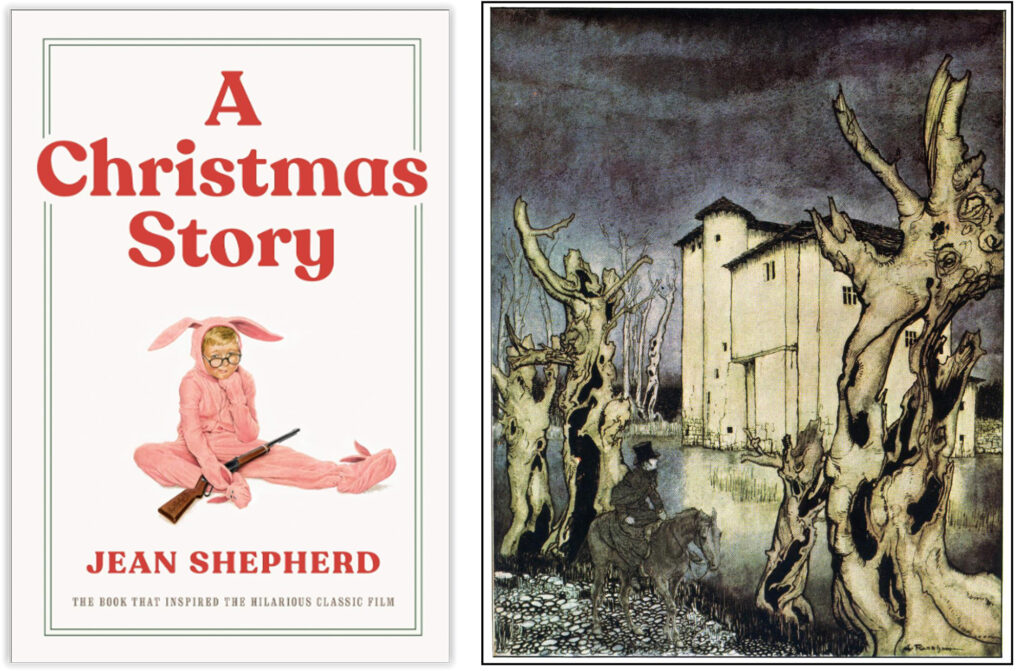
- Winner: Shepherd, Jean. A Christmas Story: The Book That Inspired the Hilarious Classic Film (1966). The classic 1983 movie (the leg lamp, the BB gun) was based on the short stories reprinted here, from Shepherd’s In God We Trust, All Others Pay Cash.
Day after day, eon after eon. Waiting for three weeks for something to come in the mail to a kid is like being asked to build the Pyramids singlehanded, using the #3 Erector set, the one without the motor. We never did get much mail around our house anyway. Usually it was bad news when it did come. Once in a while a letter marked OCCUPANT arrived, offering my Old Man $300 on his signature only, no questions asked, ‘Even your employer will not be notified.’ They began with: ‘Friend, are you in Money troubles?’ My Old Man could never figure out how they knew, especially since they only called him OCCUPANT.”
- Runner-up: Poe, Edgar Allan. “The Fall of the House of Usher” (1839). A bit of high-brow Halloween for you … Context: at the Resurrecting Romanticism conference I participated in a panel discussion, “Nurturing the New Romantics”. (Video will be available at some point: check the Books & Essays page.) Poe is a perfect example of why aspiring Romantics need some guidance, because he shows the dark side of Romanticism. “The House of Usher” includes the supernatural, insanity, Gothic architecture, and even a pseudo-medieval story. Here’s the current entry for “The Fall of the House of Usher” in Timeline 1700-1900. I’m just starting the first major edit of Timeline, so this is likely to change. (Check the Books & Essays page to see if the Timeline is available yet.)
1839: Edgar Allan Poe, “The Fall of the House of Usher”. Masterpiece of Gothic horror, with madness, death, & decay; part of the Romantic movement in literature (1798 Esthetics). Poe helps raise the short story to the level of serious literature. Influences Baudelaire, Swinburne, & French Symbolists (1846, 1866, 1886 Poetry), as well as Dostoevsky, A. Conan Doyle, H.G. Wells (1866, 1887 & 1895 Fiction), & many others.
EXCERPT: “During the whole of a dull, dark, and soundless day in the autumn of the year, when the clouds hung oppressively low in the heavens, I had been passing alone, on horseback, through a singularly dreary tract of country, and at length found myself, as the shades of the evening drew on, within view of the melancholy House of Usher.”
Poetry
I asked myself: which of the poems I recommended last year do I most want you to read or reread?
Winners (3 works)
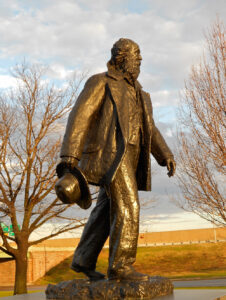
1. Braley, Berton (1882-1966). “Step Lively, Please.” This one is really beginning to resonate.
I am old as the hills
And there’s snow on my crest,
But the heart of me thrills
With an unageing zest
At blithe Youth, elate
With old drams and new laughter,
And at men fighting Fate
For the goals they are after.I am old, but the light
In my eyes is on duty
To capture the bright
Glowing magic of beauty.
My old pulses hammer
My old fibres dance
In rhythm with glamor
In tune with romance.I’m ancient, but never,
I swear, shall I fail
To make new endeavor
Or break a new trail,
Find joy in new skills
With new courage to prime them.
I am old as the hills
But I still dare to climb them.
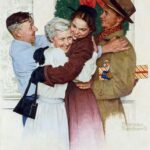
2. Guest, Edgar (1881-1959). “A Friend’s Greeting“
I’d like to be the sort of friend that you have been to me;
I’d like to be the help that you’ve been always glad to be;
I’d like to mean as much to you each minute of the day
As you have meant, old friend of mine, to me along the way.I’d like to do the big things and the splendid things for you,
To brush the gray from out your skies and leave them only blue;
I’d like to say the kindly things that I so oft have heard,
And feel that I could rouse your soul the way that mine you’ve stirred.I’d like to give you back the joy that you have given me,
Yet that were wishing you a need I hope will never be;
I’d like to make you feel as rich as I, who travel on
Undaunted in the darkest hours with you to lean upon.I’m wishing at this Christmas time that I could but repay
A portion of the gladness that you’ve strewn along my way;
And could I have one wish this year, this only would it be:
I’d like to be the sort of friend that you have been to me.
3. Bronte, Charlotte (1816-1855). “Life” (1846). This piece was published in Poems by Currer, Ellis, and Acton Bell. The Bronte sisters (ages 26 to 30) issued the collection under male pseudonyms, fearing readers would be prejudiced against poems written by women. The first edition having sold only a few copies, they turned to writing novels: Emily published Wuthering Heights in 1847, Anne published Agnes Grey in 1847, and Charlotte published Jane Eyre in 1848. This poem is the brighter side of the Romantic era (vs. Poe’s “House of Usher”): death and grief are with us, but they’re not the focus.
Life, believe, is not a dream
So dark as sages say;
Oft a little morning rain
Foretells a pleasant day.
Sometimes there are clouds of gloom,
But these are transient all;
If the shower will make the roses bloom,
O why lament its fall?
Rapidly, merrily,
Life’s sunny hours flit by,
Gratefully, cheerily
Enjoy them as they fly!
What though Death at times steps in,
And calls our Best away?
What though sorrow seems to win,
O’er hope, a heavy sway?
Yet Hope again elastic springs,
Unconquered, though she fell;
Still buoyant are her golden wings,
Still strong to bear us well.
Manfully, fearlessly,
The day of trial bear,
For gloriously, victoriously,
Can courage quell despair!
Runners-up in poetry, in alphabetical order. For these, I’m giving you a few lines as teasers, and a link to the complete text.
1. Byron, Lord. “To Thomas Moore“. From Byron (1788-1824) to the poet Thomas Moore (1779-1852), who in 1832 published a biography of Byron. It’s simpler and more heartfelt than much of Byron’s poetry – although I am extremely fond of Byron’s “Isles of Greece.”
My boat is on the shore,
And my bark is on the sea;
But before I go, Tom Moore,
Here’s a double health to thee!Here’s a sigh to those who love me,
And a smile to those who hate;
And, whatever sky’s above me,
Here’s a heart for every fate! …
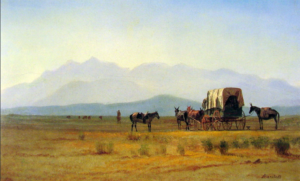
2. Clark, Badger. “The Plainsmen” (1917). Included in Starry Solitudes.
Born of a free, world-wandering race,
Little we yearned o’er an oft-turned sod.
What did we care for the fathers’ place,
Having ours fresh from the hand of God?
Who feared the strangeness or wiles of you
When from the unreckoned miles of you,
Thrilling the wind with a sweet command,
Youth unto youth called, young, young land?
3. Davies, William H. “The Happy Child” (1907). Because a sense of wonder is important, even to non-children.
I saw this day sweet flowers grow thick —
But not one like the child did pick.I heard the packhounds in green park —
But no dog like the child heard bark. …
4. Guest, Edgar (1881-1959). “Courage“. This year’s Independence Day offering, with memories of those who were willing to die for their freedom. HT Sal D.
Courage isn’t the last resort
In the work of life or the game of sport;
It isn’t a thing that a man can call
At some future time when he’s apt to fall;
If he hasn’t it now, he will have it not
When the strain is great and the pace is hot.
For who would strive for a distant goal
Must always have courage within his soul. …
5. Guest, Edgar (1881-1959). “Myself“.
I can never hide myself from me;
I see what others may never see;
I know what others may never know,
I never can fool myself, and so,
Whatever happens, I want to be
Self-respecting and conscience free.
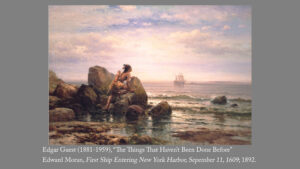
6. Guest, Edgar (1881-1959). “The Things That Haven’t Been Done Before“.
A few strike out, without map or chart,
Where never a man has been,
From the beaten paths they draw apart
To see what no man has seen.
There are deeds they hunger alone to do;
Though battered and bruised and sore,
They blaze the path for the many, who
Do nothing not done before. …
7. Hardy, Thomas (1840-1928). “The Darkling Thrush“. Speaking of winter …
I leant upon a coppice gate
When Frost was spectre-gray,
And Winter’s dregs made desolate
The weakening eye of day.
The tangled bine-stems scored the sky
Like strings of broken lyres,
And all mankind that haunted nigh
Had sought their household fires. …
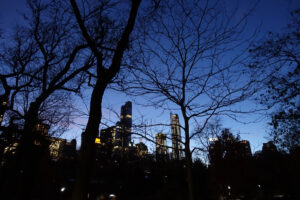
8. Teasdale, Sara (1884-1933). “Winter Dusk“. This is the whole poem.
I watch the great clear twilight
Veiling the ice-bowed trees;
Their branches tinkle faintly
With crystal melodies.
The larches bend their silver
Over the hush of snow;
One star is lighted in the west,
Two in the zenith glow.
For a moment I have forgotten
Wars and women who mourn—
I think of the mother who bore me
And thank her that I was born.
9. Van Dyke, Henry (1852-1933). “Doors of Daring“.
The mountains that inclose the vale
With walls of granite, steep and high,
Invite the fearless foot to scale
Their stairway toward the sky. …
More
- Publications & talks in 2023: At the Resurrecting Romanticism conference in Spartanburg, SC, in October 2023, I gave a talk on Romanticism and painting (1.25 hrs.) and another on painting at the 1893 Columbian Exposition in Chicago (.5 hours). I also participated in a panel discussion, “Nurturing the New Romantics”. These will eventually be available as videos: when they are, links will be on the Books & Essays page.
- Subscriptions from supporters are helping me work on two books that will appear in 2024: Getting More Enjoyment from Paintings You Love (companion volume on sculpture here), and Timeline 1700-1900 (a prequel to Timeline 1900-2021).
- For a list of all my writings and talks, see the Books and Essays page. My books are available in Kindle and/or print format via my Amazon author page, and via Ingram at major booksellers such as Barnes and Noble. And check out dozens of videos on my YouTube channel.
- For favorites recommendations from earlier years, see the Favorite Recommendations and Photos link.
- Want wonderful art such as these recommendations delivered weekly to your inbox? Check out my Sunday Recommendations list: details here.
